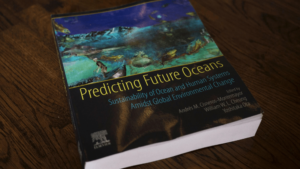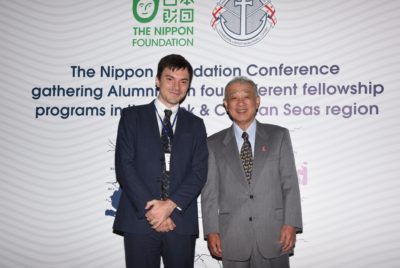Written by SMEA master’s student Karin Otsuka,
Thermos filled to the brim with steaming coffee, my mind buzzed with the day’s tasks of collecting people’s powerpoints, compiling presenter and panel bios, and attempting to orchestrate a smooth transition between presentations. This scramble of thoughts, as my heels relentlessly clambered up and down auditorium steps, was not how I initially envisioned the conference to be. Nevertheless, it was a valuable experience that helped me grow, not just as a researcher, but as a member of society.

From left to right: Dr. Yoshitaka Ota, Sallie Lau, Marlena Skrobe, and Karin Otsuka. (Courtesy of Marlena Skrobe)
Three second-year SMEA students, Marlena Skrobe, Sallie Lau, and myself, had the incredible opportunity to attend the Nippon Foundation Nereus Program Ocean Science Conference at Princeton University in New Jersey. From September 14th through the 15th, we were a part of this global network for change. This two-day conference was the culmination of years of Nereus-facilitated research and collaboration that was bound together as the book, Predicting Future Oceans: Sustainability of Ocean and Human Systems Amidst Global Environmental Change, published in August. The conference was organized as a synthesis of findings from authors who contributed to six of the major chapters.

Predicting Future Oceans: Sustainability of Ocean and Human Systems Amidst Global Environmental Change was edited by Andres M. Cisneros-Montemayor, William W.L. Cheung, and Yoshitaka Ota. (Photo by Marlena Skrobe)
Nereus, a program developed through The Nippon Foundation, was established as a hub for innovation and collaboration with the mission to bring about change for the betterment of society through ocean solutions. The program is led by Dr. William Cheung (Director of Science), an Associate Professor at the University of British Columbia, and Dr. Yoshitaka Ota (Director of Policy), who is a Research Assistant Professor here at SMEA.
Dr. Cheung kicked off the first day of presentations with his talk on the need to build upon existing knowledge to inform reports that lead to policies at any level of government. Specifically, he mentioned that developing a human-natural marine system framework can improve modeling and scenario-building of the future state of the ocean on a global scale. The remainder of the day focused on the natural science field, discussing topics such as climate-driven shifts and pollutants changing ocean chemistry.

During a panel discussion to kick off Day 2 of presentations on the future of the ocean. From left to right: Director (policy) Yoshitaka Ota, alumna Kelly Kearney, advisory panel member Philippe Cury, and Nippon Foundation Chairman Yohei Sasakawa (with translator). (Photo by Marlena Skrobe)
The sessions for the second day centered around the social sciences field, covering topics such as traditional ecological knowledge and corporate social responsibility. I was particularly excited about these sessions, as governance and community responses are areas that I am focusing on for my thesis. I actually returned to the States a little over a month before this conference, from my research trip in Miyakojima, Okinawa, Japan. There, I met with and interviewed a variety of people, from the city mayor to NGO leaders, to gauge their perceptions on addressing marine debris within the capacity of the island. They graciously shared their concerns and any available resources for me to take. I even scoped out an interviewee after sitting alongside a boat captain at the flying bridge, who gave me a tour around the coral reefs. I was also invited to clean beaches with two of my interviewees, which I especially enjoyed from the sense of mutual camaraderie and respect in getting our gloved hands dirty to fill bags full of debris. Coming from my own rich summer of conducting my first fieldwork, I was thrilled to hear about similar experiences that the presenters have gone through and how their individual research has contributed to the larger project.

Kouji Nakama (right) runs a tourist shack on Ikema Island, where he believes it is his duty to clean the beaches on a day-to-day basis. After our interview, we set up another time to clean Kaginmi Beach, which was a five minute walk from his shack. There, Nakama-san, his older brother (left), my mother, and I filled up 4 “one-ton” bags (as pictured) with marine debris during a span of 1.5 hours. Styrofoam, large fishing gear (e.g. nets and buoys), and small plastic fragments made up a large portion of debris. (Courtesy of Karin Otsuka)
Over the course of these two days of presentations, what was clear was the importance of considering context when it comes to thinking about human-ocean interactions on a global scale. With context comes the capacity to consider the situation from the community level and understand the immediate needs and concerns they face. Though there was a general consensus of the difficulties in empowering those communities that disproportionately experience anthropogenic environmental challenges, there is some anticipation for changes in addressing these issues with society and human rights at the forefront. Researchers also made a call to action towards companies and restaurants to take charge in promoting sustainable practices, for society, the environment, and the economy. We are at the point where we can no longer rely on consumer behavior and their individual choices alone.
Personally, it was inspiring to witness firsthand what a global partnership looks like in bringing together different expertise under a united goal. As a second-year Master’s student just starting the thesis-writing process, it is overwhelming to be thinking about career paths, whether to jump into a PhD, or what kind of organization best fits my research interests while also suiting my personal values. These are very uncertain times. In this sense, the conference has opened up a world of possibilities; a path that connects the academic sphere that I have been caught up in with “real-life” collaborative networks. Several Nereus fellows shared with Marlena that they “love bouncing ideas off one another” and that “it’s not until you’re actually in the room with someone that you really get to come up with something creative and awesome, and lots of projects get started from casual conversations in a relaxed setting”. With this open door, I really forced my introverted self to start talking to new faces, ask questions, and open up about my own research interests. I found myself enjoying this process and coming to the conclusion that this is something I hope to do more of in the future, whether it be during or after my time at SMEA.
On a separate note, Sallie, Marlena, and I were fortunate enough to receive funding from the Nippon Foundation in covering our travel and attendance costs. Just keep in mind that some conferences do have attendance fees, but there are many grant options for students (SMEA and UW) to help cover those costs. Sallie shared that “this makes conferences even more valuable”. So for anyone interested, seek out conferences or events that excite you, reach out to the organizing institutions, and jump on those opportunities to network and collaborate on the topics that ignite your passions!
The original version of this blog was posted on October 28, 2019 on The School of Marine and Environmental Affairs site ‘Currents: A Student Blog. It can be accessed here.







